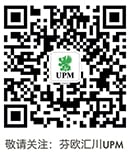(UPM, Helsinki, 28 April 2010 at 09:40) - Interim Report for January-March 2010:
- Operating profit excluding special items was EUR 116 million (loss of EUR 78 million)
- Operating cash flow was EUR 209 million (EUR 274 million)
- Positive development in delivery volumes in all businesses - sales grew by 10%
Jussi Pesonen, UPM’s President and CEO, comments on the result of the first quarter of 2010:
"UPM's operating profit improved clearly from the same period last year due to higher delivery volumes across all of our businesses and lower raw material costs. The Uruguayan operations were for the first time reported for a full quarter and contributed positively to the result.
Our first quarter sales increased by 10% from the same period last year. What is especially positive is that despite the clear increase of delivery volumes our fixed costs remained the same. However, our profitability continues to be unsatisfactory and everyday efforts to improve the situation will continue.
In Paper, delivery volumes improved especially in Asia and North America. The Paper business made an operating loss with average paper prices decreasing and fibre costs increasing from the same period last year. However, we succeeded in increasing the prices of fine and speciality papers due to good demand.
The results of Energy and Pulp business areas improved as we were able to take advantage of the good market situation. Also Label business continued the positive development which started last summer.
The Finnish stevedores' strike in March impacted all of our businesses negatively. The estimated direct impact of the strike totals about EUR 20 million affecting the first and second quarters of the year. The strike also had significant indirect impacts and we lost orders.
The volatility of the fibre markets raises concerns. The Finnish wood market was inactive at the beginning of the year. If the situation continues, it will first affect our Timber and Plywood businesses.
The recovery of advertising in print media is slow. Increased investment activity has not yet started to fully impact our businesses. However, paper demand in Europe is forecast to recover from 2009 and our paper deliveries are expected to be higher than last year. A similar development is taking place also in our other businesses.
We seem to have passed the bottom of demand and price cycle in our businesses. Therefore we expect the operating profit for 2010 to improve clearly from last year. However, variable costs are expected to increase by about 2% from last year", says Pesonen.
For more information please contact:
Mr Jussi Pesonen, President and CEO, UPM, tel. +358 204 15 0001
Mr Jyrki Salo, Executive Vice President and CFO, UPM, tel. +358 204 15 0011
UPM, Corporate Communications
Media Desk, tel. +358 40 588 3284
communications@upm.com
***
Conference call and press conference
UPM's President and CEO Jussi Pesonen will present the Interim Report for January–March 2010 in a conference call and webcast for analysts and investors, held in English, on 28 April at 13:00 Finnish time (11:00 London time, 06:00 EST).
Jussi Pesonen will also present the Interim Report for January–March 2010 in a press conference held in Finnish at UPM Group Head Office in Helsinki (main entrance, Eteläesplanadi 2) on 28 April 2010, at 14:15 Finnish time (12:15 London time, 07:15 EST).
Conference call and webcast details:
You can participate in the conference call either by dialling a number in the list below or following the webcast online at www.upm.com. Only participants who wish to ask questions in the conference call need to dial in. All participants can view the webcast presentation online.
We recommend that participants start dialling in 5–10 minutes beforehand to ensure the conference starts on time.
Conference call title: UPM-Kymmene Corporation Interim Report January-March 2010
Conference ID: 863677
Phone numbers:
US: +1 334 323 6203
Australia: +61 (0)28 2239 540
Hong Kong: +852 300 278 23
India Free: 000 8001 0036 74
Singapore: +65 6823 2171
Austria: +43 (0)268 2205 6293
Belgium: +32 (0)2 290 14 11
Czech Rep. :+420 (2)3900 0636
Denmark: +45 3271 4611
UK: +44 (0)207 1620 177
France: +33 (0)1 7099 3212
Germany: +49 (0)695 8999 0509
Hungary: +36 (0)618 8932 17
Ireland: +353 (0)1 4364 108
Italy: +39 023 0350 9005
Luxembourg: +352 2700 0734 18
Netherlands: +31 (0)20 7965 012
Norway: +47 (0)2 156 31 22
Spain: +34 917 889 897
Sweden: +46 (0)8 5052 0114
CH (GE): +41 (0)2 2592 7011
CH (ZH): +41 (0)434 5692 63
The webcast can be replayed at www.upm.com for 12 months.
***
It should be noted that certain statements herein which are not historical facts, including, without limitation, those regarding expectations for market growth and developments; expectations for growth and profitability; and statements preceded by ‘believes’, ‘expects’, ‘anticipates’, ‘foresees’ or similar expressions, are forward-looking statements. Since these statements are based on current plans, estimates and projections, they involve risks and uncertainties which may cause actual results to materially differ from those expressed in such forward-looking statements. Such factors include, but are not limited to: (1) operating factors such as continued success of manufacturing activities and the achievement of efficiencies therein including the availability and cost of production inputs, continued success of product development, acceptance of new products or services by the Group’s targeted customers, success of the existing and future collaboration arrangements, changes in business strategy or development plans or targets, changes in the degree of protection created by the Group’s patents and other intellectual property rights, and the availability of capital on acceptable terms; (2) industry conditions, such as strength of product demand, intensity of competition, prevailing and future global market prices for the Group’s products and the pricing pressures thereto, financial condition of the customers and the competitors of the Group, the potential introduction of competing products and technologies by competitors; and (3) general economic conditions, such as rates of economic growth in the Group’s principal geographic markets or fluctuations in exchange and interest rates.
